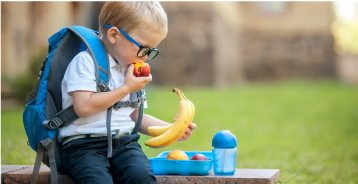Food for thought: The importance of nutrition for learning
 Family
Family
We need to process your personal information for you to interact with this website. We also use Cookies to enhance your experience. Please accept the Website Ts and Cs and Data Protection and Privacy Policy to fully access the website.
Summer has started, which means people will be spending more time outside enjoying the sunshine, from poolside vibes to beach days and picnics. The beautiful sun however, emits ultraviolet (UV) rays, which can cause sunburn and contribute to the possibility of skin cancer. According to research done by the Cancer Association of South Africa (CANSA), South Africa has one of the highest monitored ultraviolet (UV) levels in the world, which results in one of the highest skin cancer rates globally. This is where sunscreen comes to shine (see what we did there?).
What is sunscreen?
It is a substance that is usually applied as an ointment and helps protect the skin from UV rays by reflecting, scattering and absorbing the UV rays. Its effectiveness against the rays is measured by the Sun Protection Factor (SPF), which provides a guideline of how well a sunscreen will protect your skin from ultraviolet A and B radiation. To understand this better, you can read all about it in our Making Sense of Sunscreen article.
Why your skin needs it
Wearing sunscreen is one of the easiest ways to protect yourself from sunburn, which can lead to damaged skin and an increased risk of developing skin cancer. Regular use of sunscreen can reduce the risk of developing squamous cell carcinoma (SCC), which is a common form of skin cancer, by up to 40% and lowers your risk of melanoma (the most serious type of skin cancer) by up to 50%.
Sunscreen can also help prevent premature skin ageing caused by overexposure to sun rays such as wrinkling, sagging and age spots. It can be used by people with varying skin conditions, whether you require sunscreen for sensitive skin, oily skin, dry skin or acne-prone skin, and it can be found as a cream, gel or lotion.
Remember to stay sun safe!
It is important to remember that although sunscreen is one of the best ways to keep yourself safe from UV ray exposure, it alone is not enough. You also need to ensure that you wear sun-safe clothing, wide hats, UV-blocking sunglasses and seek shade whenever possible to ensure that you avoid overexposure to sun rays.
Bestmed has a benefit for sunscreen on the Beat4, Pace1, Pace2, Pace3 and Rhythm2 options, and is limited to the annual over-the-counter (OTC) limit per family. You can view the “Sunscreens & vitamins (OTC): 2022/2023” formulary on our Medicine and Chronic Benefits page.
Sources:
All About Sunscreen – Skin Cancer Foundation: https://www.skincancer.org/skin-cancer-prevention/sun-protection/sunscreen/
Be SunSmart Everywhere – CANSA: https://cansa.org.za/be-sunsmart/
Don’t Let Cancer Get Under Your Skin – CANSA: https://cansa.org.za/dont-let-cancer-get-under-your-skin/
Sunscreen – National Cancer Institute: https://www.cancer.gov/publications/dictionaries/cancer-terms/def/sunscreen
Sunscreen and Your Morning Routine – John Hopkins Medicine: https://www.hopkinsmedicine.org/health/wellness-and-prevention/sunscreen-and-your-morning-routine.